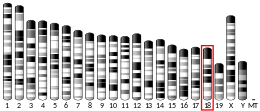MCC (gen)
Mutantni protein kolorektumskog kancera jest protein koji je kod ljudi kodiran genom MCC sa hromosoma 5.[5][6]
Aminokiselinska sekvenca
urediDužina polipeptidnog lanca je 829 aminokiselina, а molekulska težina Da. 93 027[7]
| 10 | 20 | 30 | 40 | 50 | ||||
|---|---|---|---|---|---|---|---|---|
| MNSGVAMKYG | NDSSAELSEL | HSAALASLKG | DIVELNKRLQ | QTERERDLLE | ||||
| KKLAKAQCEQ | SHLMREHEDV | QERTTLRYEE | RITELHSVIA | ELNKKIDRLQ | ||||
| GTTIREEDEY | SELRSELSQS | QHEVNEDSRS | MDQDQTSVSI | PENQSTMVTA | ||||
| DMDNCSDLNS | ELQRVLTGLE | NVVCGRKKSS | CSLSVAEVDK | HIEQLTTASE | ||||
| HCDLAIKTVE | EIEGVLGRDL | YPNLAEERSR | WEKELAGLRE | ENESLTAMLC | ||||
| SKEEELNRTK | ATMNAIREER | DRLRRRVREL | QTRLQSVQAT | GPSSPGRLTS | ||||
| TNRPINPSTG | ELSTSSSSND | IPIAKIAERV | KLSKTRSESS | SSDRPVLGSE | ||||
| ISSIGVSSSV | AEHLAHSLQD | CSNIQEIFQT | LYSHGSAISE | SKIREFEVET | ||||
| ERLNSRIEHL | KSQNDLLTIT | LEECKSNAER | MSMLVGKYES | NATALRLALQ | ||||
| YSEQCIEAYE | LLLALAESEQ | SLILGQFRAA | GVGSSPGDQS | GDENITQMLK | ||||
| RAHDCRKTAE | NAAKALLMKL | DGSCGGAFAV | AGCSVQPWES | LSSNSHTSTT | ||||
| SSTASSCDTE | FTKEDEQRLK | DYIQQLKNDR | AAVKLTMLEL | ESIHIDPLSY | ||||
| DVKPRGDSQR | LDLENAVLMQ | ELMAMKEEMA | ELKAQLYLLE | KEKKALELKL | ||||
| STREAQEQAY | LVHIEHLKSE | VEEQKEQRMR | SLSSTSSGSK | DKPGKECADA | ||||
| ASPALSLAEL | RTTCSENELA | AEFTNAIRRE | KKLKARVQEL | VSALERLTKS | ||||
| SEIRHQQSAE | FVNDLKRANS | NLVAAYEKAK | KKHQNKLKKL | ESQMMAMVER | ||||
| HETQVRMLKQ | RIALLEEENS | RPHTNETSL |
Funkcija
urediOvaj gen je potencijalni kolorektumski gen supresije tumora za koji se smatra da negativno regulira napredovanje ćelijskog ciklusa. Ortologni gen kod miševa eksprimira fosfoprotein povezan s plazmamembranom i membranskim organelama, a prekomjerna ekspresija mišjeg proteina inhibira ulazak u S-fazu. Za ovaj gen nađeno je više varijanti transkripta koje kodiraju različite izoforme.[6]
Reference
uredi- ^ a b c GRCh38: Ensembl release 89: ENSG00000171444 - Ensembl, maj 2017
- ^ a b c GRCm38: Ensembl release 89: ENSMUSG00000071856 - Ensembl, maj 2017
- ^ "Human PubMed Reference:". National Center for Biotechnology Information, U.S. National Library of Medicine.
- ^ "Mouse PubMed Reference:". National Center for Biotechnology Information, U.S. National Library of Medicine.
- ^ Kinzler KW, Nilbert MC, Vogelstein B, Bryan TM, Levy DB, Smith KJ, Preisinger AC, Hamilton SR, Hedge P, Markham A, et al. (Apr 1991). "Identification of a gene located at chromosome 5q21 that is mutated in colorectal cancers". Science. 251 (4999): 1366–70. Bibcode:1991Sci...251.1366K. doi:10.1126/science.1848370. PMID 1848370.
- ^ a b "Entrez Gene: MCC mutated in colorectal cancers".
- ^ "UniProt, P23508" (jezik: engleski). Pristupljeno 16. 10. 2021.
Dopunska literatura
uredi- Lindgren V, Bryke CR, Ozcelik T, et al. (1992). "Phenotypic, cytogenetic, and molecular studies of three patients with constitutional deletions of chromosome 5 in the region of the gene for familial adenomatous polyposis". Am. J. Hum. Genet. 50 (5): 988–97. PMC 1682619. PMID 1315124.
- Nishisho I, Nakamura Y, Miyoshi Y, et al. (1991). "Mutations of chromosome 5q21 genes in FAP and colorectal cancer patients". Science. 253 (5020): 665–9. Bibcode:1991Sci...253..665N. doi:10.1126/science.1651563. PMID 1651563.
- Hoshino Y, Horikawa I, Oshimura M, Yuasa Y (1991). "Normal human chromosome 5, on which a familial adenomatous polyposis gene is located, has tumor suppressive activity". Biochem. Biophys. Res. Commun. 174 (1): 298–304. doi:10.1016/0006-291X(91)90520-H. PMID 1846539.
- Curtis LJ, Bubb VJ, Gledhill S, et al. (1994). "Loss of heterozygosity of MCC is not associated with mutation of the retained allele in sporadic colorectal cancer". Hum. Mol. Genet. 3 (3): 443–6. doi:10.1093/hmg/3.3.443. PMID 8012355.
- Matsumine A, Senda T, Baeg GH, et al. (1996). "MCC, a cytoplasmic protein that blocks cell cycle progression from the G0/G1 to S phase". J. Biol. Chem. 271 (17): 10341–6. doi:10.1074/jbc.271.17.10341. PMID 8626604.
- Bonaldo MF, Lennon G, Soares MB (1997). "Normalization and subtraction: two approaches to facilitate gene discovery". Genome Res. 6 (9): 791–806. doi:10.1101/gr.6.9.791. PMID 8889548.
- Hartley JL, Temple GF, Brasch MA (2001). "DNA Cloning Using In Vitro Site-Specific Recombination". Genome Res. 10 (11): 1788–95. doi:10.1101/gr.143000. PMC 310948. PMID 11076863.
- Wiemann S, Weil B, Wellenreuther R, et al. (2001). "Toward a Catalog of Human Genes and Proteins: Sequencing and Analysis of 500 Novel Complete Protein Coding Human cDNAs". Genome Res. 11 (3): 422–35. doi:10.1101/gr.GR1547R. PMC 311072. PMID 11230166.
- Strausberg RL, Feingold EA, Grouse LH, et al. (2003). "Generation and initial analysis of more than 15,000 full-length human and mouse cDNA sequences". Proc. Natl. Acad. Sci. U.S.A. 99 (26): 16899–903. doi:10.1073/pnas.242603899. PMC 139241. PMID 12477932.
- Ota T, Suzuki Y, Nishikawa T, et al. (2004). "Complete sequencing and characterization of 21,243 full-length human cDNAs". Nat. Genet. 36 (1): 40–5. doi:10.1038/ng1285. PMID 14702039.
- Bouwmeester T, Bauch A, Ruffner H, et al. (2004). "A physical and functional map of the human TNF-alpha/NF-kappa B signal transduction pathway". Nat. Cell Biol. 6 (2): 97–105. doi:10.1038/ncb1086. PMID 14743216. S2CID 11683986.
- Gerhard DS, Wagner L, Feingold EA, et al. (2004). "The Status, Quality, and Expansion of the NIH Full-Length cDNA Project: The Mammalian Gene Collection (MGC)". Genome Res. 14 (10B): 2121–7. doi:10.1101/gr.2596504. PMC 528928. PMID 15489334.
- Wiemann S, Arlt D, Huber W, et al. (2004). "From ORFeome to Biology: A Functional Genomics Pipeline". Genome Res. 14 (10B): 2136–44. doi:10.1101/gr.2576704. PMC 528930. PMID 15489336.
- Mehrle A, Rosenfelder H, Schupp I, et al. (2006). "The LIFEdb database in 2006". Nucleic Acids Res. 34 (Database issue): D415–8. doi:10.1093/nar/gkj139. PMC 1347501. PMID 16381901.
- Ewing RM, Chu P, Elisma F, et al. (2007). "Large-scale mapping of human protein–protein interactions by mass spectrometry". Mol. Syst. Biol. 3 (1): 89. doi:10.1038/msb4100134. PMC 1847948. PMID 17353931.




